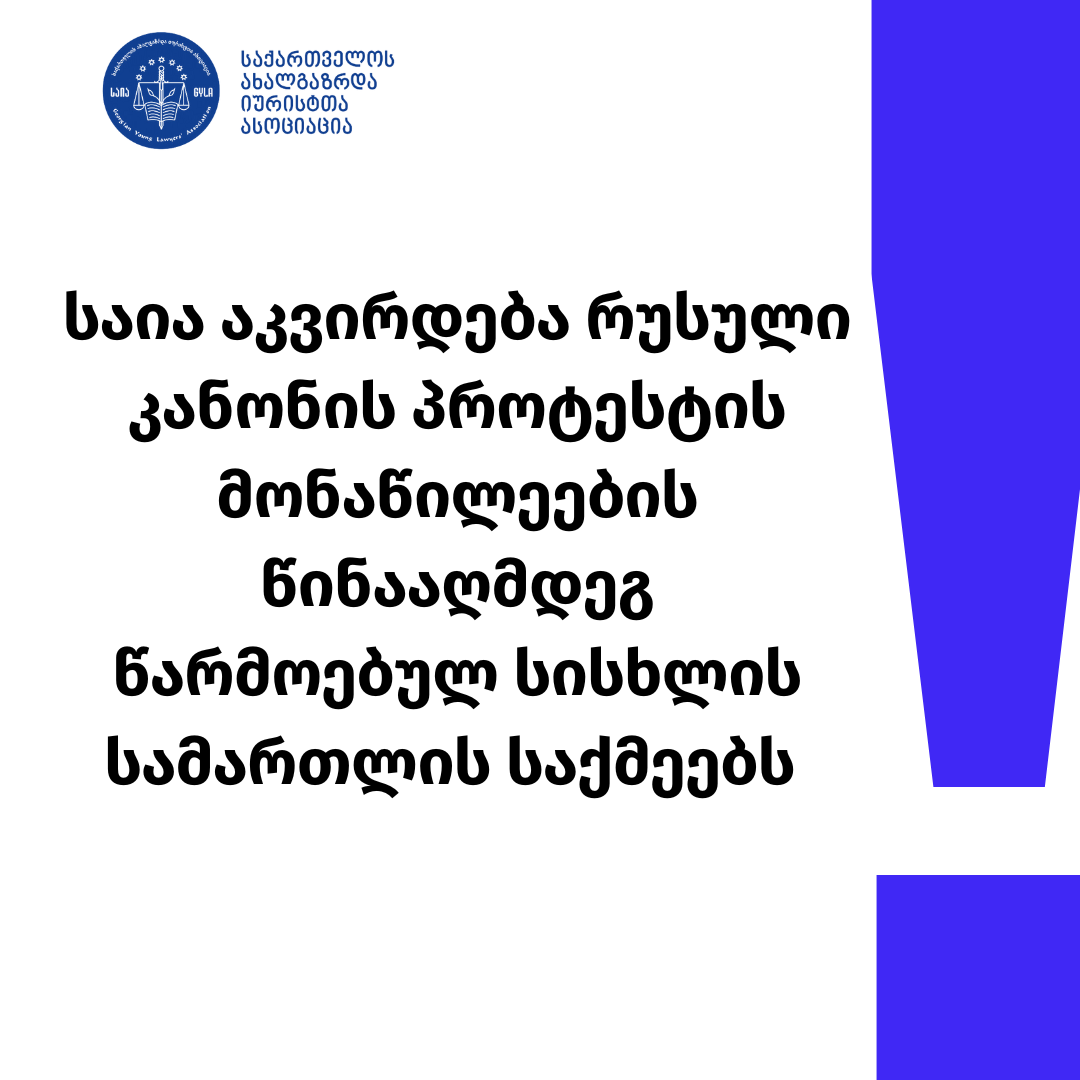


GYLA is monitoring the criminal cases of individuals arrested during the protests against the Russian Law. Based on the public sources,[1] the organization has identified criminal cases initiated[2] against 9 individuals.[3] All of these cases are/were being reviewed by the Tbilisi City Court, and with regards to each person, the court applied the most severe measure of restraint – detention; the latter remained unchanged after the review.
It is noteworthy that monitoring of criminal trials by GYLA has revealed for years that, in many instances, the review of the necessity of leaving the accused in detention as a measure of restraint has a formal character. This gives the impression that the judges assess the objectives and grounds prescribed by the Criminal Procedure Code in a blanket manner, although the grounds for detention might be neutralized gradually, leaving its continued application no longer necessary.[4]
Through the monitoring of GYLA for years, it can be observed that even if the risks for which the accused was imposed detention have been eliminated, the prosecution does not request the change of detention with a less severe restraining measure. In such cases, the prosecution, as the party representing the state, should ensure that individuals for whom the grounds for detention have ceased are not held in custody.[5] According to the European Court of Human Rights, “[t]he detention of a person is such a severe measure that it should only be applied when less restrictive alternatives are deemed insufficient to protect individual or public interests.”[6] Hence, detention should not be referred as a starting point when deciding upon a measure of restraint, but rather considered after all other measures are deemed insufficient to achieve one or more permissible objectives.[7]
It is crucial for prosecuting and judicial authorities to carefully examine the necessity of continuing detention during reviews, considering any new circumstances and not leaving an accused in custody if it is not absolutely necessary.
The delays in the start of the proceedings should also be outlined. Some hearings involving individuals arrested during protests against Russian law were delayed by 20 minutes or more[8], with one instance extending to a 50-minute delay[9]. The reasons for delays vary: the hearing of another case by the judge, delay on the side of the parties and others. It should be emphasized that the late commencements of court hearings are common in Georgia. GYLA’s court monitoring shows that nearly every third court hearing starts late.[10] Even in high-profile criminal cases, the court often cannot ensure the timely commencement of the hearings.
Notably, the cases of two individuals from the aforementioned cases have already been concluded[11], the accused did not contest the evidence and the court passed a judgment of conviction – one of them was imposed a fine, while the other – a conditional sentence. The remaining cases are in the process of hearings on the merits, with most of them currently undergoing examination of evidence.
Taking into account the fact that the cases against the protesters of the Russian Law are active, it is concerning that there has been neither thorough investigation into the alleged abuse of power by law enforcement authorities nor the identification of those responsible.
GYLA continues monitoring the criminal cases of participants of the protests against the Russian law and keep the public updated on emerging tendencies of the hearings.
[1] “MIA: 6 Participants of 8-9 May Rallies have been arrested”, Radio Tavisupleba, 09.05.2024, available at: https://www.radiotavisupleba.ge/a/32939235.html ; [updated: 11.09.2024]. “As severe punishment as possible – how the Government was restricting the protest space”, Newsge.com, 13.08.2024, available at: https://newsge.com/%e1%83%a0%e1%83%90%e1%83%aa-%e1%83%a8%e1%83%94%e1%83%98%e1%83%ab%e1%83%9a%e1%83%94%e1%83%91%e1%83%90-%e1%83%9b%e1%83%99%e1%83%90%e1%83%aa%e1%83%a0%e1%83%98-%e1%83%a1%e1%83%90%e1%83%a1%e1%83%af/. [updated: 11.09.2024].
[2] In most cases, they are accused of Article 187 or/and Article 3531 of the Criminal Code of Georgia, while Giorgi Okmelashvili and Giorgi Shanidze are additionally charged with drug-related crimes (Article 260 and Article 265 of the Criminal Code of Georgia).
[3] Giorgi Okmelashvili, Fridon Bubuteishvili, Saba Meparishvili, Omar Okribelashvili, Giorgi Shanidze, Giorgi Kuchuashvili, David Koldari, Andrei Rautberg, Vazha Durglishvili (the consideration of the cases of the last two persons has been completed).
[4] GYLA, Monitoring of Criminal Trials N16 Report, 2022, 35, available at: https://gyla.ge/files/ოქტომბერი-ნომბერი2022/16_eng%20(1).pdf. [updated: 11.09.2024].
[5] GYLA, Monitoring of Criminal Trials N15 Report, 2021, 65, available at: https://gyla.ge/files/2020/MONITORING%20OF%20CRIMINAL%20TRIALS%20REPORT%20№15.pdf. [updated: 11.09.2024].
[6] ECtHR, Ambruszkiewicz v. Poland, 38797/03, 04/05/2006, § 31.
[7] HRC Comment 35, §38; CCPR, Smanster v. Belarus, § 10.3.
[8] Court Hearing of 5 September on cases of Giorgi Kuchuashvili and Davit Koldari, Court hearing of 2 September on case of Giorgi Okmelashvili.
[9] Court hearing of 9 September on the case of Giorgi Shanidze.
[10] GYLA, Monitoring of Criminal Trials N17 Report, 2024, 46, available at: https://gyla.ge/files/Court%20Monitoring%2017.pdf. [updated: 11.09.2024].
[11] Cases of Vazha Durglishvili and Andrei Rautberg.
ჯ. კახიძის #15, თბილისი, საქართველო, 0102 ; ტელ: (995 32) 95 23 53; ფაქსი: (995 32) 92 32 11; ელ-ფოსტა: gyla@gyla.ge; www.gyla.ge
15, J. Kakhidze str. 0102, Tbilisi, Georgia. Tel: (995 32) 95 23 53; Fax: (995 32) 92 32 11; E-mail: gyla@gyla.ge; www.gyla.ge